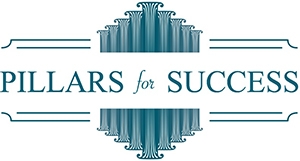The 9 Pillars
Want to know how to be a better parent? We can help! The 9 Pillars build on one another so that both adults and children work toward the same goals successfully. Whether you learn more about our program through our parent workshops or by reading the text below, take your time to absorb the rules and tools in each Pillar—the more you understand and practice, the more success you will achieve.
Here are brief summaries of the 9 Pillars that will teach you how to be a better parent.
PILLARS FOR SUCCESS-A Summary of the Rules and Tools in our Parent Workshops
1. Children Think Differently from Adults
2. Emotional Age Affects Our Feelings and Behavior
3. Disruptive/Challenging Behavior is a Way of Coping
4. How We See Things Influences Our Relationships
As you will learn in Pillar #4 the way you understand what is happening affects how you respond. The same is true for your child. If you think your child is crying because he hurt himself you will react very differently than if you think your child is crying while he has a temper tantrum. This Pillar will give you more suggestions for how to interact with your child before, during and after an episode of challenging behavior. With new ideas, you will celebrate new success by using the various methods you will learn that will help you be a better parent.
Along with other treasures you will have a better understanding of the importance of verbal and nonverbal messages, why to avoid “negatively charged words” (such as the word “consequences”,) the power of empathy, the importance of separating “attributes” from “identity” (do you have a “bad” child or do you have a child with “bad behavior?”) and how separating the two influences the way you see your child. This Pillar will give you even more ideas to help you successfully redirect your child.
5. Adult Responses Can Alter the Child’s Behavior
Our parent workshops will help you understand that what you say and how you act affects how your child behaves. Remember: you can’t control another person’s behavior but you are in full control of your own behavior. You will learn exactly what to say and do so that you can be more successful in influencing your child to choose a more cooperative behavior. Pillar #5 will add useful ideas to your toolbox (such as, “there will be no war if parents do not show up at the fighting line”) to help you learn how to be a better parent, avoid arguments and stay “in charge.”
Once you understand the significance of your actions and responses through our parent workshops, you will be much more aware of how you can increase positive outcomes with the child(ren) in your life. In your search to learn how to be a better parent, Pillar #5 will add useful concepts to your toolbox and show you how to avoid confrontation while remaining “in charge.” You will have additional tools to create new interactions that increase positive outcomes.
6. How We Communicate Changes Our Messages
7. Win-Win Outcomes Are Possible
8. Success = Avoiding Arguments
We know that actors follow “scripts” when they make a movie. But did you know that many of the conversations we have with our children also follow “scripts.” We often argue about the same things in the same way over and over again.
Here’s an example of a “cooperation script”: your child is expected to finish his homework after dinner every night,
Johnny: “Mom, my homework is done. Can I watch tv before I got to bed?
Mom: “Good job, Johnny. Go ahead and watch your favorite show.”
Here’s an example of an “argument script”:
Johnny: “I just want to watch tv now. I’ll do my homework in the morning.”
Mom: “You know the rules, Johnny. No tv until your homework is done.”
Johnny: “But mom, I’m sick and tired of school work and I just want to watch tv.”
Mom: “Stop whining and finish your homework!”
Johnny: “I won’t and you can’t make me.”
It’s amazing how we repeat these conversations over and over and don’t realize it. You’ll learn to repeat the positive scripts, create effective scripts and get rid of the scripts that lead to arguments or anger or bad feelings.
You’ll learn the power of “empathy” (sympathizing with your child):
Mom: “I understand, Johnny. Sometimes it’s easy to get homework done and sometimes you just don’t feel like it. Maybe if you take a 5-minute break and then finish your homework that will help. Would you like a piece of gum while you’re taking your break?”
Try some of these ideas and see how effectively you will take big steps toward learning how to be a better parent.
9. Honoring the Child Has Amazing Results
This Pillar will remind you to do things that are just “common sense” but we often forget. Remember to thank your child: for doing the right thing, for making his bed, for saying “ok” when you asked him to do something, for trying, for admitting a lie. Our lives are full of opportunities to direct our attention to the “positive” and we often forget to do that. You can even “marvel” at your child, “How did you figure that out? How did you change your mind and decide to help!”
Unleash the power of the 3 P’s: Positive Proactive Praise!
You can learn more about these ideas in our parent workshops but you will have a great start just trying some of the ideas you will learn from reviewing our Pillars.
And so ends the summary of the Nine Pillars of how to be a better parent and many, many, many rules and tools to strengthen your parenting skills and the child’s opportunity to be successful.
I might consider wishing you “good luck” but “luck” is not what will change your life. Review the Pillars and practice the rules and tools because THAT is what will change your life! Want to join in our next parent workshop? Contact us today for more information!




